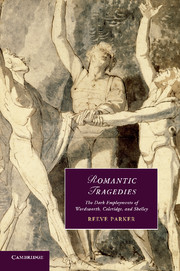Book contents
- Frontmatter
- Contents
- List of illustrations
- Acknowledgments
- Introduction: “Prowling out for dark employments”
- PART I WORDSWORTH
- CHAPTER 1 Reading Wordsworth's power: narrative and usurpation in The Borderers
- CHAPTER 2 Cradling French Macbeth: managing the art of second-hand Shakespeare
- CHAPTER 3 “In some sort seeing with my proper eyes”: Wordsworth and the spectacles of Paris
- CHAPTER 4 Drinking up whole rivers: facing Wordsworth's watery discourse
- PART II COLERIDGE AND SHELLEY
- Notes
- Bibliography
- Index
- CAMBRIDGE STUDIES IN ROMANTICISM
CHAPTER 4 - Drinking up whole rivers: facing Wordsworth's watery discourse
Published online by Cambridge University Press: 05 May 2014
- Frontmatter
- Contents
- List of illustrations
- Acknowledgments
- Introduction: “Prowling out for dark employments”
- PART I WORDSWORTH
- CHAPTER 1 Reading Wordsworth's power: narrative and usurpation in The Borderers
- CHAPTER 2 Cradling French Macbeth: managing the art of second-hand Shakespeare
- CHAPTER 3 “In some sort seeing with my proper eyes”: Wordsworth and the spectacles of Paris
- CHAPTER 4 Drinking up whole rivers: facing Wordsworth's watery discourse
- PART II COLERIDGE AND SHELLEY
- Notes
- Bibliography
- Index
- CAMBRIDGE STUDIES IN ROMANTICISM
Summary
“Rivers! oh! / The name has terror in it”
Virtually from the beginning, critical accounts of The Borderers have centered on what to make of Rivers. One such account comes as laconic hearsay about failure: in December 1797 Wordsworth learned that Thomas Harris, the manager of Covent Garden, had “pronounced it impossible that [the play] should succeed in the representation.” Shortly after, Elizabeth Threlkeld, a friend of the Wordsworths, supplied Dorothy with a gloss: “the metaphysical obscurity of one character, was the great reason of its rejection.” But Wordsworth himself, doubtless anticipating such an opinion and hoping to engage its premises, had already drafted, earlier in 1797, what in “The Fenwick Note” of 1843 he called the “short essay illustrative of that constitution & those tendencies of human nature which make the apparently motiveless actions of bad men intelligible to careful observers.” That brief essay, since its first publication early last century, has helped perpetuate and justify the emphasis on Rivers. Its invented, hypothetical psychobiography, like Coleridge's contemporary note for Osorio, imagined a theater manager, an examiner of plays, an acting company, and ultimately – after anticipated publication – a [London] audience and reviewers who would apply it to the figure called Rivers in the play; toward the end, it explicitly encouraged seeing Rivers as susceptible to such analysis, a view that the rhetorical energies of the Early Version seem to me paradoxically to undermine or resist.
- Type
- Chapter
- Information
- Romantic TragediesThe Dark Employments of Wordsworth, Coleridge, and Shelley, pp. 79 - 106Publisher: Cambridge University PressPrint publication year: 2011

